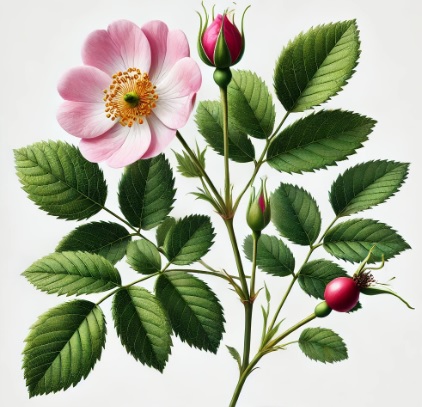Alpine rose (Rosa pendulina), commonly known as the or the Mountain rose, is a species of wild rose native to the mountainous regions of Europe. It is distinguished by its pendulous flower clusters and its adaptability to cold and rocky environments. Rosa pendulina is valued for its hardy nature and delicate, attractive flowers.
Botanical Classification:
Kingdom: Plantae
Order: Rosales
Family: Rosaceae
Genus: Rosa
Species: Rosa pendulina
Plant Characteristics:
Rosa pendulina is characterized by:
Flowers: Clusters of small to medium-sized flowers that are typically pink or pale red. The flowers have a subtle fragrance and are known for their drooping or pendulous arrangement, which gives the plant its common name.
Foliage: Green, pinnate leaves with serrated edges. The foliage is generally dense and complements the plant's flowers.
Growth Habit: A deciduous shrub that grows to a height of 1 to 2 meters. It has a spreading habit with arching branches, which contributes to its drooping appearance.
Soil and Light: Prefers well-drained, rocky soil and full sunlight. It is well-suited to alpine or mountainous regions and can tolerate cold temperatures.
Chemical Composition and Structure:
The chemical composition of Rosa pendulina includes:
Essential Oils: Contains aromatic compounds that contribute to the subtle fragrance of the flowers. Specific compounds may include geraniol and citronellol.
Flavonoids and Tannins: Present in the leaves and flowers, providing antioxidant and astringent properties.
Organic Acids: Contributing to the aromatic profile and potential health benefits of the plant.
Uses and Benefits:
Aesthetic: Valued for its attractive, pendulous clusters of flowers and hardy nature, making it suitable for rock gardens, alpine settings, and naturalistic landscapes.
Cosmetic: Extracts from the flowers may be used in skincare products for their subtle fragrance and potential soothing properties.
Medicinal: Traditionally used in herbal medicine for its mild astringent properties and potential anti-inflammatory effects. Scientific evidence supporting these uses is limited.
Culinary: While not commonly used in culinary applications, rose hips from Rosa pendulina can be utilized to make herbal teas and infusions, providing a delicate flavor and vitamin C.
Applications:
Gardening: Ideal for rock gardens, alpine settings, and naturalistic landscapes due to its hardy nature and attractive flowers.
Cosmetics: Flower extracts used in skincare products for their fragrance and potential soothing qualities.
Medicinal: Utilized in traditional herbal remedies for its astringent and anti-inflammatory properties, though scientific support is limited.
Culinary: Rose hips used in teas and infusions for their flavor and vitamin C content.
Environmental and Safety Considerations:
Environmental Impact: Hardy and adaptable to cold, rocky environments; contributes to the biodiversity of alpine and naturalistic gardens.
Safety: Generally safe to handle and use; individuals with allergies or sensitivities should exercise caution. Consult a healthcare provider before using Rosa pendulina for medicinal purposes.
INCI:
Antioxidant agent. Ingredient that counteracts oxidative stress and prevents cell damage. Free radicals, pathological inflammatory processes, reactive nitrogen species and reactive oxygen species are responsible for the ageing process and many diseases caused by oxidation.
Skin protectant. It creates a protective barrier on the skin to defend it from harmful substances, irritants, allergens, pathogens that can cause various inflammatory conditions. These products can also improve the natural skin barrier and in most cases more than one is needed to achieve an effective result.
Synonyms:
CAS:
![]() Alpine rose
Alpine rose 

